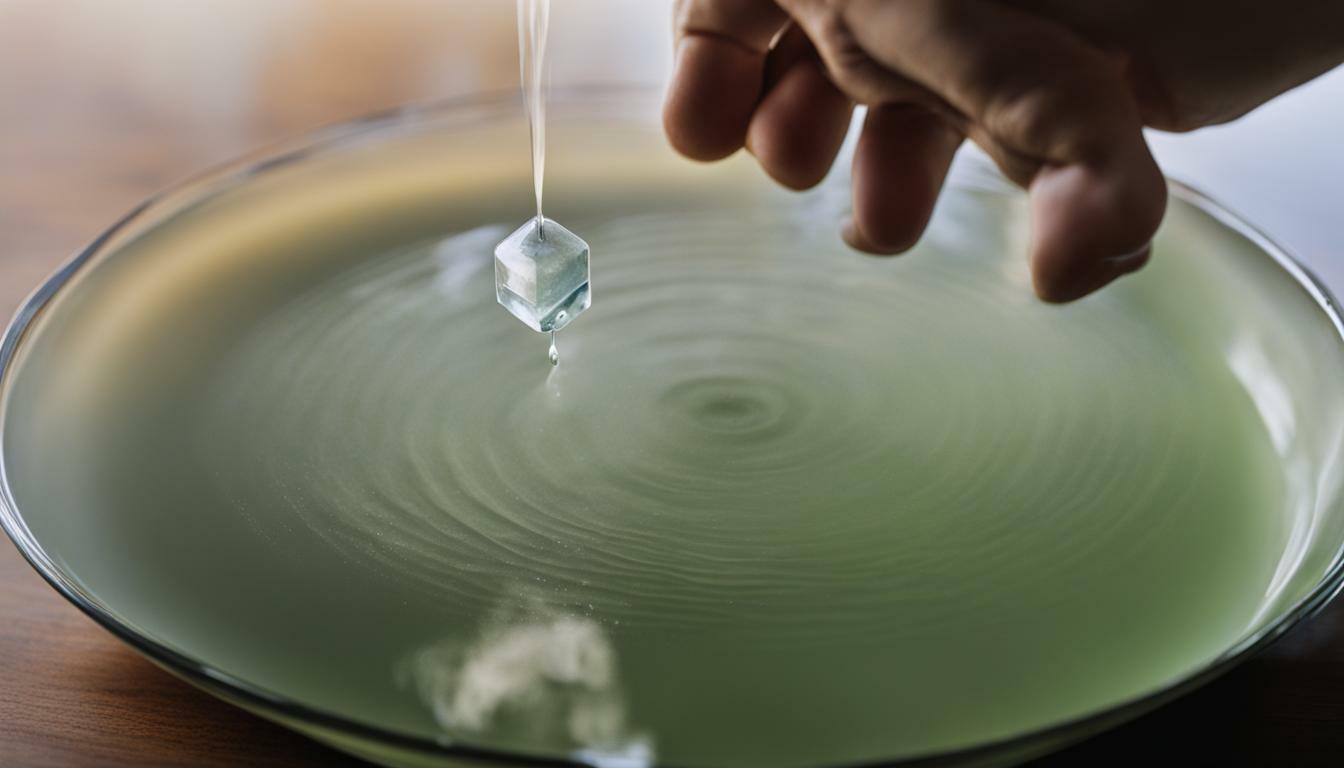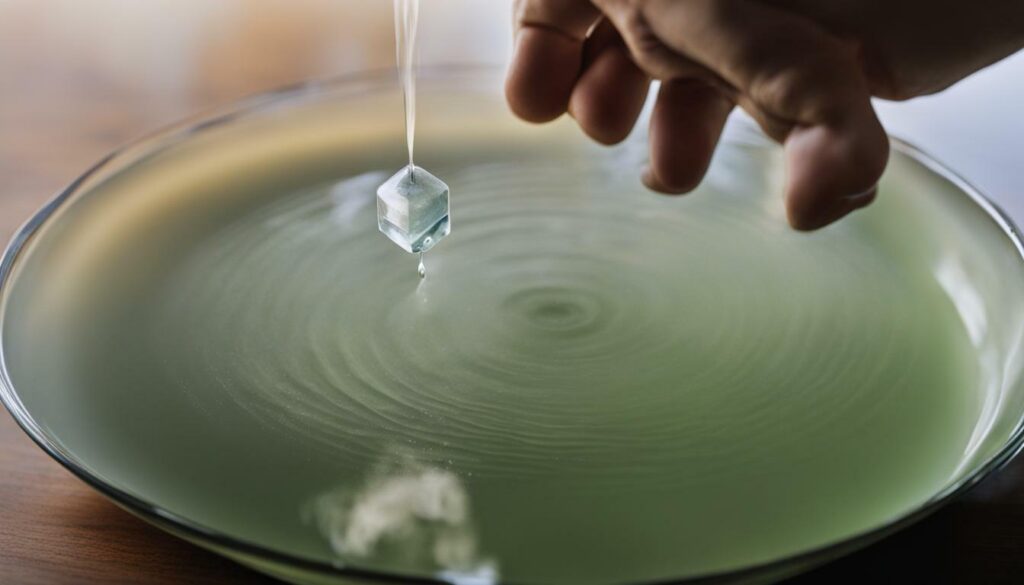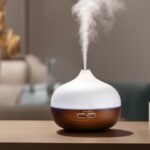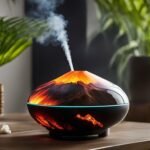
Maintaining your diffuser water reservoir is crucial for ensuring the best diffusing experience and prolonging the lifespan of your diffuser. Knowing when to change your diffuser water reservoir is an important part of diffuser maintenance. It is recommended to clean your diffuser every time you change the oils you are using to prevent mixing of different aromas and to ensure optimal performance.
Cleaning instructions can be found in the diffuser’s booklet, and the general process involves emptying the reservoir, wiping it out, and letting it air-dry. By following these steps, you can remove any residue or buildup that may affect the quality of your diffuser’s performance.
When it comes to diffusing sessions, it’s important to be mindful of the recommended duration. Typically, diffusing sessions should be limited to 30-60 minutes, depending on the type of oil being used. This allows for safe and effective diffusion of the essential oils without overwhelming your space.
Leaving a diffuser with plain water on overnight is generally safe, but it’s essential to consider the size of your reservoir. If your diffuser has a larger reservoir, it can safely hold plain water overnight without any issues. However, if your reservoir is smaller, it’s best to empty it and refill it with fresh water each time you plan to use it.
It is crucial to exercise caution when using essential oils. These concentrated substances can be potent and may have different effects on individuals. If you have any allergies, medical conditions, or if you are pregnant or breastfeeding, it’s advisable to consult with a healthcare professional before using essential oils and diffusers.
When diffusing around children and pets, it’s important to be extra careful. Shorter diffusing times, well-ventilated areas, and keeping the diffuser out of reach are recommended safety measures to ensure the well-being of your loved ones.
In addition to regular cleaning, proper diffuser maintenance offers numerous benefits. It helps prevent corrosion, which can extend the lifespan of your diffuser. It also improves the overall aroma of the essential oils, providing a more enjoyable and effective diffusing experience.
Choosing the right location for your diffuser, following the instructions for filling the reservoir, and using high-quality essential oils are also key factors in maintaining your diffuser’s optimal performance.
In conclusion, proper maintenance of your diffuser water reservoir is essential for a seamless diffusing experience. Regular cleaning, following recommended guidelines, and being mindful of safety considerations will ensure that you can enjoy the benefits of diffusing essential oils for years to come.
Why Cleaning Your Diffuser Reservoir Regularly is Essential
Regularly cleaning your diffuser reservoir is essential to prevent the unwanted mixing of aromas and to ensure your diffuser performs at its best. When different essential oils are used in succession without cleaning, residual scents can linger and mix with new fragrances, resulting in an unpleasant aroma. Cleaning your diffuser reservoir between oil changes effectively eliminates these unwanted combinations and allows for a more enjoyable aromatherapy experience.
The process of cleaning your diffuser reservoir is straightforward and can be done in a few simple steps. Start by referring to the diffuser’s instruction booklet for specific cleaning instructions, as these may vary depending on the model. Typically, you will need to empty the reservoir of any remaining water and oils, wipe it out with a soft cloth or cotton swab, and allow it to air-dry completely before adding new oils.
Regular cleaning not only prevents aroma mixing but also helps maintain the optimal performance of your diffuser. Over time, oils can leave residue and buildup in the reservoir, potentially clogging the diffuser and affecting its ability to disperse fragrances effectively. By cleaning the reservoir regularly, you ensure that the diffuser operates smoothly and provides an even diffusion of your chosen essential oils.
In summary, keeping your diffuser reservoir clean is crucial for preventing aroma mixing, maintaining optimal performance, and enjoying the full benefits of aromatherapy. Follow the manufacturer’s instructions, clean the reservoir between oil changes, and allow it to dry thoroughly. By incorporating regular cleaning into your diffuser maintenance routine, you can create a pleasant and hassle-free environment for your aromatherapy sessions.
Proper Cleaning Process for Your Diffuser Water Reservoir
To clean your diffuser water reservoir effectively, follow these simple steps: empty the reservoir, wipe it out with a soft cloth, and allow it to air-dry completely. Regular cleaning of the diffuser is crucial to maintain its performance and ensure the pure diffusion of essential oils. By removing any residue or buildup, you can prevent the mixing of different aromas and enhance the overall experience.
Step 1: Empty the Reservoir
Start by unplugging your diffuser and carefully pouring out any remaining water or oil from the reservoir. Be sure to do this over a sink or basin to avoid any spills. It is important to empty the reservoir before proceeding with the cleaning process.
Step 2: Wipe it Out
Next, take a soft cloth or paper towel and gently wipe the inside of the reservoir. Pay attention to any areas where oil or residue may have accumulated. This will help remove any dirt or buildup that could affect the performance of your diffuser and ensure a clean diffusion experience.
Step 3: Air-Dry Completely
After wiping out the reservoir, allow it to air-dry completely before refilling it with water or adding essential oils. This step is crucial to prevent any moisture from lingering, which could lead to mold or mildew growth. By ensuring the reservoir is dry, you can maintain a clean and hygienic environment for diffusing.
Incorporating these simple cleaning steps into your diffuser maintenance routine will help prolong the lifespan of your diffuser and ensure optimal performance. It is recommended to clean your diffuser water reservoir every time you change the oils you are using or at least once every week to maintain a fresh and pleasant aroma.
Recommended Diffusing Session Duration
It is advisable to limit your diffusing sessions to 30-60 minutes, taking into account the specific type of oil you are using. This duration allows for optimal diffusion of the aromatherapy benefits without overwhelming your senses. Different oils have varying levels of potency, and some may be too intense if diffused for extended periods. By adhering to this recommended time frame, you can enjoy the therapeutic effects of essential oils while ensuring a pleasant and balanced sensory experience.
To help you keep track of your diffusing sessions, you can set a timer or use the timer function on your diffuser, if available. This way, you can relax and enjoy the soothing scents knowing that you are maintaining a safe and effective diffusing duration.
In addition to considering the duration of your diffusing sessions, it is essential to pay attention to the quality of the oils you use. High-quality essential oils are more potent and offer better therapeutic benefits. Ensure that you source your oils from reputable suppliers to guarantee purity and effectiveness.
| Type of Oil | Recommended Diffusing Time |
|---|---|
| Lavender | 30-45 minutes |
| Peppermint | 30-60 minutes |
| Frankincense | 45-60 minutes |
| Tea Tree | 30-45 minutes |
Remember that diffusing essential oils is a personal experience, and it is important to listen to your body and adjust the duration based on your preferences and sensitivities. By practicing responsible diffusing, you can create a harmonious and enjoyable environment filled with the therapeutic scents of your favorite essential oils.
Leaving Your Diffuser Overnight with Plain Water: Is it Safe?
Leaving your diffuser with plain water overnight is generally safe if your diffuser reservoir is adequately large, ensuring sufficient space for the water to evaporate without causing any issues. It’s important to consider the size of your reservoir when deciding whether to leave water in it overnight. A larger reservoir allows for more water to evaporate slowly, maintaining the integrity of the diffuser and preventing any potential problems.
When using plain water overnight, it’s crucial to remember that essential oils should not be added to the water without a proper carrier oil. Essential oils are highly concentrated and can cause damage to the diffuser if not diluted correctly. Adding plain water overnight can provide a gentle and refreshing mist to your space, but it won’t offer the benefits of aromatherapy that essential oils provide.
However, if you prefer to use essential oils in your diffuser overnight, it is recommended to follow the instructions provided by the diffuser manufacturer. Some diffusers have specific settings for overnight use, ensuring safe and effective diffusion. It’s always best to consult the diffuser’s user manual or contact the manufacturer for guidance on using essential oils overnight.
| Reservoir Size | Recommended Use |
|---|---|
| Small | Empty and refill daily for optimal performance. |
| Medium | Can be left with water overnight, but be cautious with essential oils. |
| Large | Safe to leave with water overnight, allowing for slow evaporation. |
Remember, proper diffuser maintenance is essential for optimal performance and longevity. Clean your diffuser regularly, follow the manufacturer’s instructions for filling the reservoir, and choose high-quality essential oils. Taking these steps will help ensure the pure diffusion of oils and prevent dirt buildup and mold growth. Use your diffuser responsibly, considering factors such as allergies, medical conditions, pregnancy, and breastfeeding. Additionally, always diffuse in well-ventilated areas and with shorter diffusing times when around children and pets.
Safety Considerations When Using Essential Oils
When using essential oils, it is crucial to exercise caution, especially if you have allergies, medical conditions, or are pregnant or breastfeeding. Diffusing around children and pets should also be done with care. Essential oils are highly concentrated and potent, and their effects can vary depending on the individual and the specific oil being used. It is important to be aware of any potential risks and take appropriate measures to ensure the safety of yourself and those around you.
Allergies
Individuals with allergies should be particularly cautious when using essential oils. Some oils may trigger allergic reactions, such as skin irritation, respiratory problems, or even anaphylaxis in severe cases. It is recommended to perform a patch test before using a new oil topically, and if any adverse reactions occur, discontinue use immediately. If you have known allergies, consult with a healthcare professional or an aromatherapist to identify which oils are safe for you to use.
Medical Conditions
If you have underlying medical conditions, it is important to consult with a healthcare professional before using essential oils. Certain oils may interact with medications or exacerbate certain conditions. For example, oils high in menthol, such as peppermint or eucalyptus, can potentially worsen symptoms for individuals with asthma or respiratory conditions. Additionally, some oils may affect blood pressure, hormone levels, or blood clotting. Always seek professional advice to ensure the safe and appropriate use of essential oils.
Pregnancy and Breastfeeding
During pregnancy and breastfeeding, it is essential to take extra precautions when using essential oils. Some oils can be harmful to the developing fetus or infant, while others may pass through breast milk and affect the baby. Certain oils are known to have abortifacient properties and should be avoided altogether during pregnancy, such as clary sage, tansy, and pennyroyal. It is advisable to consult with a qualified healthcare professional before using any essential oils during these periods.
Diffusing essential oils around children and pets also requires careful consideration. Children may be more sensitive to the effects of essential oils, so it is recommended to use lower dilutions and shorter diffusing times. Some oils, such as those containing phenols or high levels of menthol, should be avoided altogether in young children. It is important to provide adequate ventilation when diffusing oils and monitor for any adverse reactions or discomfort.
By being mindful of these safety considerations and following proper guidelines, you can enjoy the benefits of essential oils while minimizing any potential risks. Always remember to do your research, seek professional advice when needed, and listen to your body’s signals to ensure a safe and enjoyable experience with essential oils.
The Benefits of Proper Diffuser Maintenance
Engaging in proper diffuser maintenance brings numerous benefits, such as preventing corrosion, extending your diffuser’s lifespan, and enhancing the delightful aroma of your essential oils. To ensure the optimal performance of your diffuser, it is important to regularly clean the diffuser reservoir and follow the manufacturer’s instructions for maintenance.
Cleaning your diffuser regularly helps prevent corrosion by removing any residue or buildup that may accumulate over time. This not only prolongs the lifespan of your diffuser but also ensures that it functions at its best. A clean diffuser also provides a better diffusion experience by allowing the essential oils to disperse properly, resulting in a more satisfying aroma.
In addition to cleaning, it is crucial to choose high-quality essential oils for your diffuser. Using oils of inferior quality may lead to clogging or damage to the diffuser mechanism. By investing in quality oils, you can avoid potential issues and ensure a longer lifespan for your diffuser.
| Benefits of Proper Diffuser Maintenance |
|---|
| Prevents corrosion |
| Extends your diffuser’s lifespan |
| Enhances the delightful aroma of your essential oils |
Summary
- Regular diffuser cleaning prevents corrosion and extends the diffuser’s lifespan.
- Using high-quality essential oils ensures optimal performance and avoids potential damage.
- Proper maintenance enhances the delightful aroma of your essential oils, providing a more satisfying diffusion experience.
Selecting the Right Location, Filling the Reservoir, and Using High-Quality Oils
To maximize the performance of your diffuser, it’s crucial to select the right location, follow proper reservoir filling techniques, and use high-quality essential oils. The location of your diffuser plays a significant role in how effectively it disperses the aroma throughout a room. Choose an area that is central to the space you want to fill with fragrance, ensuring that it is placed on a sturdy, level surface to prevent accidental spills. Avoid placing the diffuser near windows or air vents, as this can affect its performance.
When filling your diffuser’s reservoir, it’s essential to follow the manufacturer’s instructions. Some diffusers require you to fill the reservoir to a specific level, while others have a maximum fill line. Overfilling the reservoir can lead to malfunction or leakage. Take care not to spill any water or oil outside the reservoir when filling it, as this can damage the diffuser and create a potential safety hazard.
The quality of essential oils you use in your diffuser can greatly impact its performance and the overall experience. It’s important to invest in high-quality oils that are free from synthetic fragrances or additives. Look for oils that are pure, organic, and sourced from reputable manufacturers. These oils not only provide a more authentic and enjoyable aroma but also help prevent clogs and residue buildup in the diffuser. Remember to store your essential oils properly, away from heat and sunlight, to maintain their quality over time.
In conclusion, selecting the right location, filling the reservoir correctly, and using high-quality essential oils are essential steps in maximizing the performance of your diffuser. By following these guidelines, you can enjoy a consistent and pleasant aroma in your space while ensuring the longevity of your diffuser. Always refer to the instruction manual provided by the manufacturer for specific recommendations and guidelines regarding your diffuser’s maintenance and performance.
Conclusion
Maintaining your diffuser water reservoir is essential for optimal diffuser performance and longevity, and practicing proper diffuser maintenance ensures a delightful and safe aromatherapy experience. Knowing when to change your diffuser water reservoir is crucial to prevent the mixing of different aromas and to ensure the purity of your diffused oils. It is recommended to clean your diffuser every time you change the oils you are using to maintain the desired scent and to avoid any unwanted odors.
When cleaning your diffuser water reservoir, refer to the diffuser’s instruction booklet for specific cleaning instructions. The general process involves emptying the reservoir, wiping it out with a clean cloth or cotton swab, and allowing it to air-dry completely before refilling. This will help avoid dirt buildup and mold growth, ensuring that your diffuser functions optimally and that the aroma of your essential oils remains pure and potent.
Additionally, it is important to be mindful of the duration of your diffusing sessions. Depending on the type of oil being used, it is recommended to limit diffusing sessions to 30-60 minutes. This allows for proper scent diffusion without overwhelming the space. Remember to always follow the recommended guidelines provided by the essential oil manufacturer.
While leaving your diffuser with plain water overnight is generally safe, it is crucial to consider the size of your diffuser water reservoir. If your reservoir is small, it is advisable to empty and clean it regularly to prevent the growth of bacteria or mold. On the other hand, larger reservoirs may be left with plain water overnight without significant concerns. However, it is always best to exercise caution and maintain a clean diffuser environment.
Finally, when using essential oils, it is important to prioritize safety. Essential oils can be powerful and may cause adverse reactions, especially for individuals with allergies, medical conditions, or those who are pregnant or breastfeeding. When diffusing around children and pets, it is advisable to use shorter diffusing times and ensure proper ventilation in the room. Selecting a suitable location for your diffuser, following the instructions for filling the reservoir, and using high-quality essential oils are also essential for optimal diffuser performance and a pleasant aromatherapy experience.
By incorporating these practices into your diffuser maintenance routine, you can prevent corrosion, prolong the lifespan of your diffuser, and enhance the aroma of your essential oils. Enjoy the benefits of aromatherapy with a well-maintained diffuser and create a soothing atmosphere in your home or workspace.
FAQ
When should I change my diffuser water reservoir?
It is recommended to change your diffuser water reservoir every time you change the oils you are using to prevent mixing of different aromas and to ensure optimal performance.
How do I clean my diffuser reservoir?
To clean your diffuser reservoir, empty the reservoir, wipe it out using a soft cloth, and let it air-dry before refilling. Detailed cleaning instructions can be found in the diffuser’s booklet.
How long should I run my diffuser during a session?
The duration of diffusing sessions should typically be limited to 30-60 minutes, depending on the type of oil being used. This helps prevent overwhelming aromas and ensures safe usage.
Is it safe to leave my diffuser with plain water on overnight?
Leaving a diffuser with plain water on overnight is generally safe if the reservoir is large enough. However, it is always recommended to follow the manufacturer’s instructions and consider the size of your diffuser’s reservoir.
Are there any safety considerations when using essential oils in a diffuser?
Essential oils can be powerful and should be used with caution. If you have allergies, medical conditions, or if you are pregnant or breastfeeding, it is important to consult with a healthcare professional before using essential oils. Diffusing around children and pets should also be done carefully, with shorter diffusing times and in well-ventilated areas.
What are the benefits of proper diffuser maintenance?
Proper diffuser maintenance helps prevent corrosion, prolongs the lifespan of the diffuser, and improves the aroma of the essential oils. By regularly cleaning the diffuser, you ensure the pure diffusion of oils and avoid dirt buildup and mold growth.
What should I consider when selecting a location for my diffuser and filling the reservoir?
Select a stable surface away from direct sunlight and drafts for your diffuser. Follow the manufacturer’s instructions for filling the reservoir, ensuring you do not overfill or submerge any essential oil ports. Additionally, select high-quality essential oils for optimal diffuser performance.







